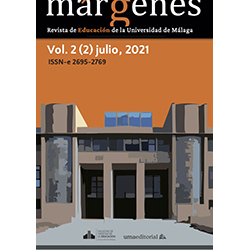Reflections to improve: experiences in educational research
DOI:
https://doi.org/10.24310/mgnmar.v2i2.10900Keywords:
Educative research, Qualitative Research, Research experiences, training, critical reflectionAbstract
The following reflective work shows the vision of two doctoral thesis students who, after starting in the world of educational research, believe it is necessary to share their experiences and first steps with people who are also beginning their career in this field. Likewise, it is intended to share with the teachers in charge of training them on this path, what are the uncertainties, needs and emotions found during training as a researcher. In this way, the aim is to promote good formation, encourage research in the educational context in order to understand it, and help to improve it.
Downloads
Metrics
Publication Facts
Reviewer profiles N/A
Author statements
Indexed in
-
—
- Academic society
- N/A
- Publisher
- Universidad de Málaga
References
Best, J.W. (1982). Como investigar en educación. Morata.
Contreras, J. y Pérez de Lara, N. (2010). La experiencia y la investigación educativa. En J. Contreras y N. Pérez de Lara. (Ed.), Investigar en la experiencia educativa (pp. 20-92). Ediciones Morata, S.L.
Cruz, A. (2014). Importancia de la investigación educativa. Consejo de Transformación Educativa. Recuperado de: https://cutt.ly/pgw6XiV
Denzin, N., Lincoln, Y. (Eds.). (2018). The SAGE handbook of qualitative research (5th ed.).Sage.
https://www.qualitative-research.net/index.php/fqs/article/view/14
Domingo, A. (2020). Profesorado reflexivo e investigador. Propuestas y experiencias formativas. Narcea.
Everston, C. M. y Green, J.L. (1989). La observación como indagación y método. En M.C. Wittrock (Ed.), La investigación como enseñanza. Métodos cualitativos y de observación. Vol. II (pp.303-430). Paidos/MEC.
Fernández, M.A. y Del Valle, J. (2017). Cómo iniciarse en la investigación académica. Una guía práctica. Fondo Editorial.
Flick, U. (2018). The Concepts of Qualitative Data: Challenges in Neoliberal Times for Qualitative Inquiry. SAGE journals, 25 (8), 713-720. https://doi.org/10.1177/1077800418809132
Kamberelis, G. y Dimitriadis, G. (2013). Grupos focales. En N. K. Denzin y Y. S. Lincoln. (Ed.), Métodos de recolección y análisis de datos. Vol.IV (pp. 495-532). Editorial Gedisa, S.A.
Real Academia Española (2019). Diccionario de la Lengua Española. Edición de Tricentenario Recuperado de: https://bit.ly/35iLR7g
Rodríguez, G; Gil, J; García, E. (1999). Metodología de la investigación cualitativa. Ediciones Aljibe.
Sierra. E. y Blanco, N. (2017). El aprendizaje de la escucha en la investigación educativa. Qualitative Research in Education, 6(3), 303-326. doi:10.1783/qre.2017.2783
Tallaferro, D. (2006). La formación para la práctica reflexiva en las prácticas profesionales docentes. Educere, La revista venelozana de educación, 10(33), 269-273.
Tejedor, F.J. (2004). Investigación educativa: ¿Hacia dónde vamos? En L. Buendía, D. Gónzález, T. Pozo. (Coords.), Temas fundamentales de la investigación educativa (pp.63-104). La Muralla, S.A.
Toro, I. y Parra, R. (2010). Fundamentos epistemológicos de la investigación y la metodología de la investigación Cualitativa/cuantitativa. Fondo Editorial Universidad EAFIT.
Vázquez, R. y Angulo, F. (2003). Introducción a los estudios de caso. Los primeros contactos con la investigación etnográfica. Ediciones Aljibe.
Vázquez, R. (2011). Investigar con estudio de caso la dirección escolar. Ediciones Aljibe.
Wood, P. y Smith, J. (2018). Investigar en educación. Conceptos básicos y metodología para desarrollar proyectos de investigación. Narcea.
Downloads
Published
How to Cite
Issue
Section
License
The editorial team of Márgenes supports an open Access policy of scientific knowledge. apostamos claramente por una política de acceso abierto del conocimiento científico (see Berlin Declaration).
Authors with work published in this journal accept the following conditions:
- This journal provides immediate free access to its content under the principle of making research freely available to the public. All contents published in Márgenes are subject to the Creative Commons Reconocimiento-SinObraDerivada 4.0 Internacional
It is the responsibility of the authors to obtain the necessary permissions of the images that are subject to copyright.
Authors whose contributions are accepted for publication in this journal will retain the non-exclusive right to use their contributions for academic, research and educational purposes, including self-archiving or deposit in open-access repositories of any kind.
The electronic edition of this magazine is edited by the Editorial of the University of Malaga (UmaEditorial), being necessary to cite the origin in any partial or total reproduction.
- Authors can enter into other additional independent contractual agreements for the non-exclusive distribution of the version of the article published in this journal (e.g. including it in an institutional repository or publishing it in a book) on the condition that they clearly indicate that the work was originally published in this journal.
- Authors are allowed and recommended to publish their work on the Internet (for example on institutional and personal websites), before and after the publication, as this could lead to constructive exchanges and a more extensive and quick circulation of published works (see The Effect of Open Access).















